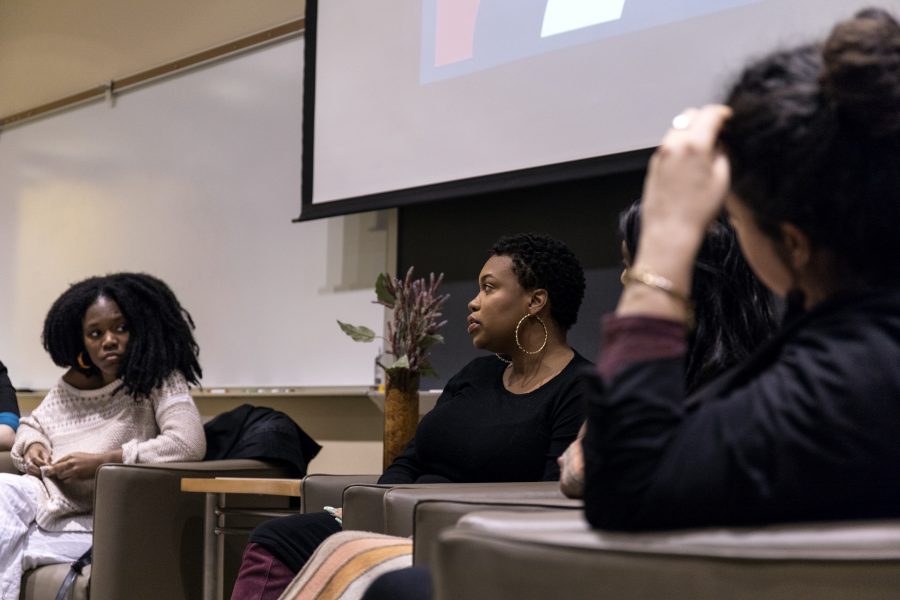
The #MeToo panel, consisting of students and professors, was sponsored by PASA and the Office of Educational Equity. Photo by Elle Cox '21
In a crowded room in Oechsle Hall, community members gathered for the #MeToo Panel which revealed several sentiments towards the influence of Greek life on sexual assault at Lafayette.
The panel was sponsored by Pards Against Sexual Assault (PASA) and the Office for Educational Equity. Panelists consisted of two students, Sara Hayet ’18 and Mikai Johnson ’19, and professors Nandini Sikand and Randi Gill-Sadler.
Educational Equity Coordinator Jessica Brown reached out to the Pards Against Sexual Assault Executive Board a few months ago to see if they would be interested in cosponsoring a panel discussion about the #MeToo movement that has taken off in the last few months. This movement began in the wake of many women and men revealing sexual harassment and sexual violence often at the hands of powerful men in Hollywood.
The discussion was facilitated by Cristina Usino and Parker Gaglione ’18. Usino is currently Assistant Director of Admissions but previously served as the Assistant Director of Intercultural Development and Coordinator for Gender & Sexuality Programs.
Usino and Gaglione, along with Brown and PASA, worked with the campus community to develop the questions asked of the panel and the audience at the talk.
“I’m always so amazed at our students, [such as] Sara and Mikai, for being so brave to sit in that space and share from their own lived experiences, their own leadership positions and then how wonderful and rich our professors are,” Usino said.
“Professor Sikand and Professor Gill-Sadler…are women who I just feel privileged to know, privileged to be around, privileged to be in their spaces and feel like they are catalysts for change on our campus,” she added.
The discussion began with Usino touching on the background of the #MeToo movement, which was created by Tarana Burke years ago. Usino also said the panel would aim to also address issues of women and men of color and other marginalized groups often ignored in national conversations.
Gaglione went on to explain the format of the panel, which included prepared questions that would start at the macro-level and move to the micro-level of the issue of sexual assault on Lafayette’s campus. Prepared questions included: Has the #MeToo movement had any legislative effects? Do you believe the #MeToo movement has desensitized sexual assault or raised awareness? Have we seen a change on Lafayette’s campus, how can we enact change? How have marginalized groups been treated by the movement? Do you think the Me Too movement is lasting?
These questions led to more discussion from the panelists, and topics ranged from the racial inequality within the movement, to the Aziz Ansari story of alleged sexual misconduct, to Greek life on Lafayette’s campus.
Johnson said she believes that sorority women are at a much higher risk of being sexually assaulted than non-Greek women. Later in a phone interview PASA member Sam Arnold ’18 cited that within that realm, men in Greek life are more likely to perpetuate sexual assault.
According to a 2007 study cited by CNN, fraternity men are three times more likely to commit rape than other men on college campuses. The study was the third reflecting this result, the article reported.
The latter half of the discussion focused heavily on interactions within Greek life at Lafayette and the issues Greek life presents.
“I think the manner that [the conversation] occurred was really a very forward invitation for Greek fraternities specifically and their sort of ripple effect on our campus in regards to gender violence and misogyny. So I wasn’t expecting it to be that forward of a conversation. However, I do think that those forward conversations are the only way to have a real authentic invitation to change,” Usino said.
Usino said also that the most frequent perpetrators of sexual assault are not the caricatures often imagined, but the man who you know, who holds the door open and helps you study.
Arnold agreed that the conversation focused heavily on Greek life, but for the right reasons.
“I do think that’s a necessary conversation for people to have,” but she wishes people had a larger discussion about social life at Lafayette in general, she said.
Gaglione agrees that the conversations started at the talk were important to the campus and said that reactions both during and after the panel were indicative of its success.
“The number of people who came to the front after to talk to Christina and Jessica after about meeting up to further discuss what can be done on campus was really something I viewed as the biggest success of the talk,” he said.